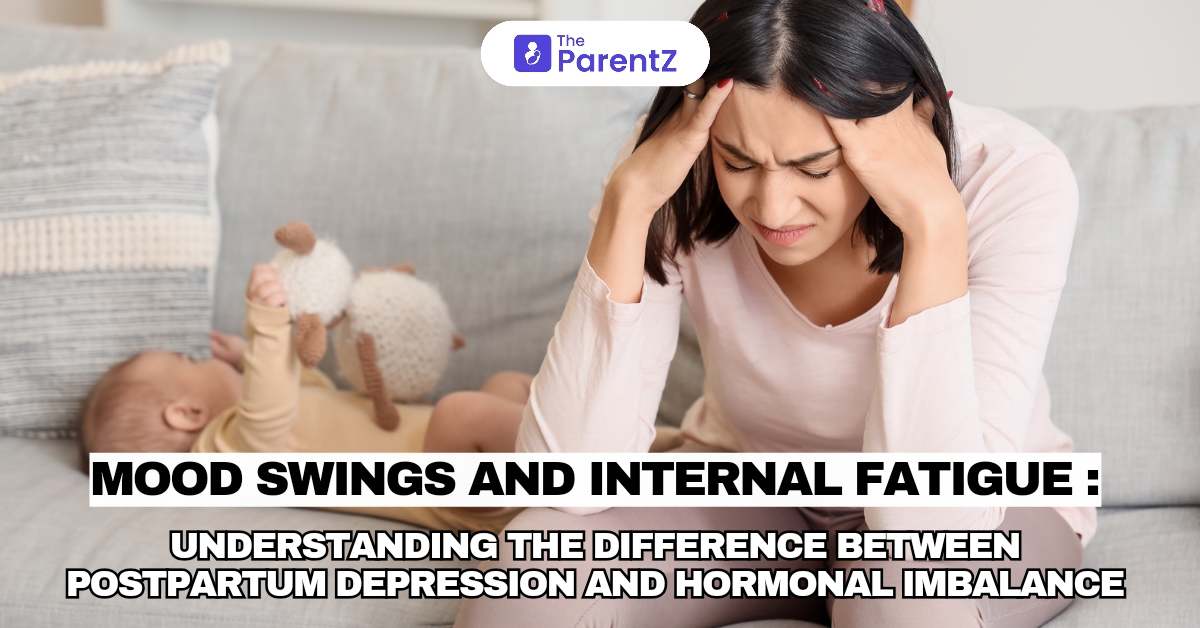The postpartum period is a transformative time for new mothers, marked by significant physical, emotional, and hormonal changes. It is common for new mothers to experience mood swings and internal fatigue during this period. However, it is crucial to differentiate between normal postpartum mood swings, hormonal imbalances, and postpartum depression (PPD). Understanding these differences is essential for seeking appropriate support and treatment. In this article, we will explore the distinctions between postpartum mood swings, hormonal imbalances, and postpartum depression, helping new mothers recognize and address their mental health needs.
What Are Postpartum Mood Swings?
Postpartum mood swings are emotional fluctuations that new mothers commonly experience after childbirth. These mood swings are typically characterized by:
- Sudden Changes in Mood: New mothers may feel happy one moment and tearful the next.
- Irritability and Sensitivity: Increased sensitivity to minor stressors and irritability.
- Emotional Overwhelm: Feeling overwhelmed by the responsibilities of motherhood.
Causes of Postpartum Mood Swings:
- Hormonal Shifts: After childbirth, there is a rapid decline in pregnancy hormones such as estrogen and progesterone, which can impact mood regulation.
- Sleep Deprivation: Caring for a newborn often leads to disrupted sleep patterns, contributing to mood swings.
- Lifestyle Adjustments: The transition to motherhood involves significant lifestyle changes, which can be stressful and emotionally taxing.
Understanding Internal Fatigue
Internal fatigue refers to a profound sense of exhaustion that is not solely due to physical activity. It can manifest as:
- Persistent Tiredness: Feeling tired even after adequate rest.
- Lack of Energy: Difficulty engaging in daily activities due to a lack of energy.
- Mental Exhaustion: Experiencing cognitive difficulties, such as trouble concentrating or making decisions.
Causes of Internal Fatigue:
- Hormonal Imbalance: Postpartum hormonal fluctuations can lead to fatigue.
- Nutritional Deficiencies: Nutrient deficiencies, such as iron or vitamin D, can contribute to fatigue.
- Emotional Stress: The emotional demands of caring for a newborn can lead to mental and physical exhaustion.
Hormonal Imbalance vs. Postpartum Depression
While mood swings and internal fatigue can be attributed to hormonal imbalances, it is important to recognize when these symptoms may indicate a more serious condition, such as postpartum depression (PPD).
Hormonal Imbalance:
- Transient Symptoms: Symptoms of hormonal imbalance, such as mood swings and fatigue, are often transient and improve with time.
- Mild Emotional Impact: While hormonal changes can cause emotional fluctuations, they do not typically result in severe emotional distress.
- Responsive to Lifestyle Changes: Symptoms may improve with lifestyle changes, such as improved sleep, nutrition, and self-care.
Postpartum Depression:
- Persistent Symptoms: Symptoms of PPD are persistent and do not improve over time without treatment.
- Severe Emotional Impact: PPD involves severe emotional distress, including feelings of hopelessness, worthlessness, and intense sadness.
- Impaired Functioning: PPD can significantly impair a mother’s ability to care for herself and her baby, impacting daily functioning.
Recognizing the Symptoms of Postpartum Depression
Postpartum depression is a serious mental health condition that requires prompt attention and treatment. Key symptoms of PPD include:
- Persistent Sadness: Feeling sad, hopeless, or empty most of the time.
- Loss of Interest: Losing interest in activities that were once enjoyable.
- Intense Anxiety: Experiencing excessive worry or anxiety about the baby’s health or well-being.
- Sleep Disturbances: Severe sleep disturbances, such as insomnia or sleeping too much.
- Appetite Changes: Significant changes in appetite, leading to weight loss or gain.
- Difficulty Bonding: Struggling to bond with the baby or feeling indifferent towards the baby.
- Thoughts of Harm: Having thoughts of harming oneself or the baby.
Treatment and Support for Postpartum Depression
Recognizing the need for help is the first step towards recovery. Treatment for postpartum depression may include:
- Professional Counseling: Therapy with a mental health professional can help address the underlying issues contributing to PPD.
- Medication: Antidepressant medications may be prescribed to help balance brain chemicals and improve mood.
- Support Groups: Joining a support group for new mothers can provide a sense of community and shared experiences.
- Self-Care Practices: Prioritizing self-care, including adequate rest, nutrition, and exercise, is crucial for mental well-being.
Managing Hormonal Imbalances and Mood Swings
For new mothers experiencing mood swings and fatigue due to hormonal imbalances, several strategies can help manage these symptoms:
- Balanced Diet: Eating a nutritious diet rich in vitamins and minerals can support hormonal balance and energy levels.
- Regular Exercise: Physical activity can boost mood and reduce fatigue.
- Adequate Sleep: Prioritizing sleep and seeking help with nighttime baby care can improve overall well-being.
- Stress Management: Techniques such as meditation, deep breathing, and yoga can help manage stress levels.
Conclusion
Postpartum mood swings and internal fatigue are common experiences for new mothers, often resulting from hormonal changes and the demands of caring for a newborn. However, it is essential to distinguish between these normal postpartum experiences and postpartum depression, which is a serious condition requiring professional intervention.
By understanding the differences between hormonal imbalances and postpartum depression, new mothers can seek the appropriate support and treatment needed for their mental health. Remember, reaching out for help is a sign of strength, and there are many resources available to support new mothers on their journey to recovery and well-being.








Be the first one to comment on this story.